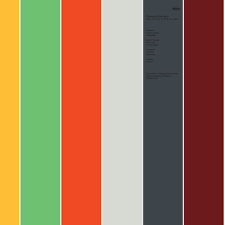So, what is it I hear? Initially, I hear the opening fanfare of ‘Ziegelrot’ roar forth on a wave of distorted electronic noise. Jarringly unpleasant and fashioned with teeth-rattling precision to hit me (the listener and responsive object to which this sound owes no explanation) where it hurts. ‘Ziegelrot’, which could be a multitude of nasty guitars leaned on amps compressed into one devastating layer, is like a diamond-tipped pen jabbed deep behind my eyes.
Mercifully it only lasts a few minutes, akin to Brinkmann screaming "wake up" at me; a hideous alarm clock going off which just as suddenly recedes into silence. ‘Kadmiumgelb’ follows as a relatively soothing grey power generator hum, or it could be what my fridge is doing while I sleep at night. ‘Kadmiumgelb’ is my fridge dreaming to itself of forming a supergroup and playing Rock In Rio. To a vast audience comprised of slightly inferior fridges looking to party hard.
The eleven pieces on What You Hear (Is What You Hear) are all renderings in process, eleven fixed surface points of varying texture and mass given subjective reason through the spatial elongation of time. One piece may sound at its outset as though it was an ambient environmental recording and yet five, or ten, minutes later will have been whipped up into an industrialised electrical dust storm. The view from the window is unchanged, rather it’s the listener who has stayed rooted to a fixed point in time which has then been stretched to the limits of elastic malleability.
"Now" is always the scariest place to be. Brinkmann is testing the limits of "now" on this release, revelling in the listener’s rising anxiety at being frozen still while everything seems to seethe and heave in perpetual motion with no actual forward momentum. On ‘Agent Orange’, a rapidly ticking time bomb counts down the fractions of seconds until an inevitable doomsday moment wipes out all living matter. The ticking clatters on manically, each instant of existence feeling and hurting, until finally the clock splutters and stutters to an abrupt halt. The airflight sickness is suddenly replaced by silent vertigo as you realise the floor has been ripped from under you. The death plunge you always anticipated commences, Wile E Coyote gazing balefully as you plummet past.
‘Purpurrot’ works similar internal drama as it reaches panic attack levels of smothering suffocation, billowing up inside lungs being crushed under sheer density while simultaneously coaxed into hyperventilation. ‘Perinon’ begins like a massed sewing bee at the lowest bowels of Hell before grimly growing to resemble a vast factory production line rattling and chattering on into eternity, the sound of stamped and filed bureaucracy turned to deathly metal. The gently flickering wash of ‘Bleiweiss’ offers sweet respite while ‘Graphit’ even allows a throbbing, minimalist rhythmic template to emerge from the sonic detritus. The latter pieces are almost as though Brinkmann is apologising for the earlier extremities.
Why should he? Thomas Brinkmann doesn’t hate me, and neither does the crafting and chiselling of sound which bears his name. There is no context for this music and, as all gallery denizens gathered in white-walled chapels of conceptual art know, this means that any reason or meaning applied to these occupied spaces are purely and subjectively personal however much we may wish to suppress any emotional responses. Lack of context is the ultimate artistic get-out clause.
So I hear "now", the scariest place to be, stretched to absolute breaking point as I try to hide the sweat breaking and the chest tightening. I try to contain the explosion and in doing so prolong the intensity of these elasticised and sometimes painful moments. But you will quite possibly hear something else.
<div class="fb-comments" data-href="http://thequietus.com/articles/18014-thomas-brinkmann-what-you-hear-is-what-you-hear-review” data-width="550">


